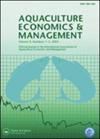Climate risk management practices of fish and shrimp farmers in the Mekong Region
IF 3.8
2区 经济学
Q1 AGRICULTURAL ECONOMICS & POLICY
引用次数: 5
Abstract
Abstract As comparative multi-country studies are rare, not much is known about the effects of regional differences in social-ecological conditions on the adoption of climate risk management practices in aquaculture. This study is based on a large-scale survey of practices of aquaculture operators in Cambodia, Laos, Myanmar, Thailand, and Vietnam. Climate-related risks to profits of aquaculture farms in the Mekong Region are typically managed alongside water-related, disease and other business risks. Farmers who were more concerned with risks to profitability had a history of undertaking more risk management practices. Farmers growing shrimp (rather than fish), or adopting more intensified production systems, had more risk management practices. Wealthier and more educated farmers had experience with more practices for dealing with current risks, as well as recognized the need for strategies to adapt to a changing climate in the future. Information access is a factor in the adoption of new practices and strategies. Adoption of aeration or use of information-communication technologies to manage climate-related risks, for example, was more likely among more educated and wealthy farmers who belonged to growers’ groups. The findings also suggest that attitudes toward innovation, levels of investment and social norms influence adoption of technological, organizational and informational practices.湄公河地区鱼虾养殖户的气候风险管理实践
由于比较多国的研究很少,关于社会生态条件的区域差异对水产养殖采用气候风险管理做法的影响知之甚少。本研究基于对柬埔寨、老挝、缅甸、泰国和越南水产养殖经营者做法的大规模调查。在湄公河地区,与气候有关的水产养殖场利润风险通常与与水有关的风险、疾病和其他商业风险一起加以管理。更关心盈利风险的农民有更多风险管理实践的历史。养虾(而不是养鱼)或采用更集约化生产系统的农民采取了更多的风险管理措施。较富裕和受教育程度较高的农民有更多应对当前风险的经验,并认识到需要制定适应未来气候变化的战略。获取信息是采用新做法和新战略的一个因素。例如,在受教育程度较高、属于种植者团体的富裕农民中,采用通风或使用信息通信技术来管理气候相关风险的可能性更大。研究结果还表明,对创新的态度、投资水平和社会规范影响技术、组织和信息实践的采用。
本文章由计算机程序翻译,如有差异,请以英文原文为准。
求助全文
约1分钟内获得全文
求助全文
来源期刊

Aquaculture Economics & Management
FISHERIES-
CiteScore
7.30
自引率
17.90%
发文量
21
期刊介绍:
Aquaculture Economics and Management is a peer-reviewed, international journal which aims to encourage the application of economic analysis to the management, modeling, and planning of aquaculture in public and private sectors. The journal publishes original, high quality papers related to all aspects of aquaculture economics and management including aquaculture production and farm management, innovation and technology adoption, processing and distribution, marketing, consumer behavior and pricing, international trade, policy analysis, and the role of aquaculture in food security, livelihoods, and environmental management. Papers are peer reviewed and evaluated for their scientific merits and contributions.
 求助内容:
求助内容: 应助结果提醒方式:
应助结果提醒方式:


